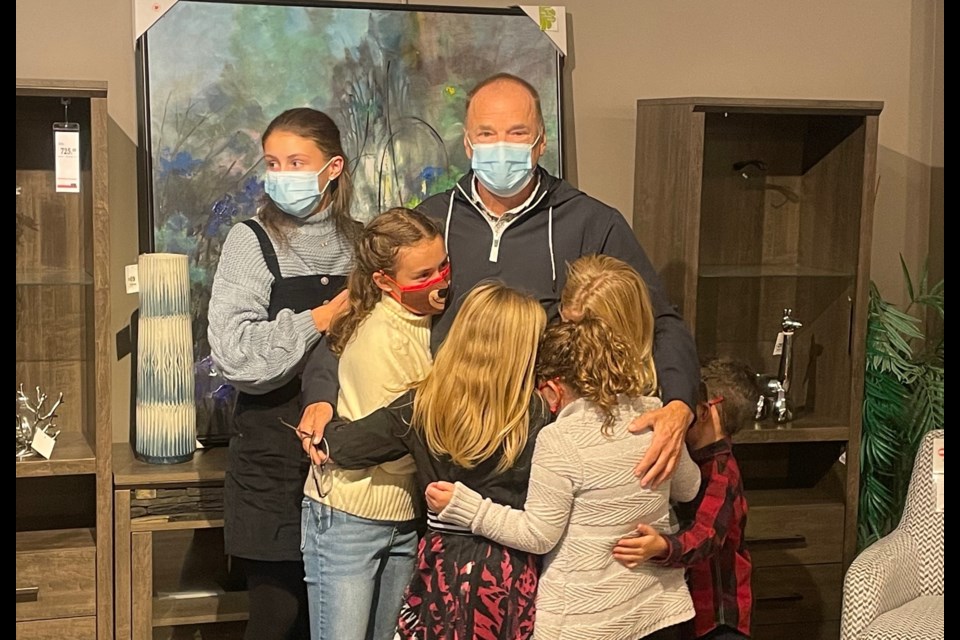A $25,000 donation to the North Bay Regional Health Centre's Renal Unit is leading off a drive for community donations toward the project. Renal units provide a full range of treatment options for patients with kidney disease.
The donation was made by the family-owned local business, The Brick - North Bay.
NBRHC is planning an expansion of its Renal Unit in 2023 and Paul Heinrich, NBRHC President says the donation provides a generous start to the $400,000 project.
"It's an incredibly generous gift and it's so important for our organization," said Heinrich. "Because we have donations like this from the community, we're able to really invest in the very best state-of-the-art equipment, technology, and people and serve patients close to home."
The Brick – North Bay owners Paul and Annette Lalonde were inspired to donate following Paul’s harrowing health crisis. While vacationing in Florida in 2018, he came down with a serious infection that caused sepsis.
Sepsis is the body's extreme response to an infection that creates a life-threatening medical emergency. Sepsis happens when an infection you already have triggers a chain reaction throughout your body
It attacked Paul's major organs causing renal failure and a massive heart attack among other complications. He also received two stents in his heart while in Florida.
The journey home after 22 days in the ICU was worrying as his health was extremely fragile. Upon returning to Canada, he received additional cardiac interventions and required immediate renal replacement therapy (dialysis). He was then put on the transplant list for a kidney and pancreas.
“We are grateful for the exceptional care Paul is receiving at the dialysis unit at NBRHC," said Annette, Paul’s wife. "Dialysis allows Paul the time needed while waiting for a transplant.”
Following three separate calls to receive organs with subsequent cancellations, along with receiving quadruple bypass surgery, and delays as a result of COVID, Paul was removed from the transplant list, being deemed an unsuitable candidate. Paul’s step-daughters Michelle and Jenna came forward as live kidney donors and Jenna was determined to be a donor match.
Paul has gone for dialysis treatment at the local hospital three times a week for the past four years
"Right now they are so crowded that Paul is literally getting his dialysis in a closet, and he comes home and says jokingly 'It's kind of shitty. I'm doing my dialysis in a closet and there's no TV,' because when they go to the unit they're in a nice chair and they get to watch TV but some of these patients have been moved to accommodate the surging numbers."
Despite COVID, business has been good this year so Annette approached Paul about donating.
"How much?" asked Paul. "About $25,000," she answered. "And he said 'we can't do more?' and I said I don't think we can. He said, 'I'd like it to be more. They are my family.'
Dr. Gavin Harman, Nephrologist with the service of Internal Medicine explains that NBRHC is one of 27 regional dialysis programs in the province. Patient volume projections show the NBRHC dialysis population is expected to grow by approximately 24 per cent over the next 10 years.
"From a patient's perspective, it's an emotional roller coaster," Dr. Harman told BayToday. "Dialysis and kidney disease hits all walks of life. It doesn't matter what your health risk factors are, it can happen to anyone despite feeling perfectly healthy before it hits. We're having increasing numbers of patients every year."
NBRHC’s kidney clinic has approximately 260 patients with chronic kidney disease, have received a transplant, or are performing home peritoneal dialysis. The clinic also provides education, support, and monitoring for these patients.
“We currently have 71 hemodialysis patients receiving dialysis Monday through Saturday from 7 a.m. to 7 p.m,” explains Dr. Harman. “Last year, we provided more than 9,000 hemodialysis treatments to patients with kidney failure, and up to 18 patients performed their own peritoneal dialysis in their homes.”
Hemodialysis is a treatment to filter wastes and water from your blood, and nephrologists are medical professionals who diagnose, treat, and manage acute and chronic kidney problems and diseases.
Emphasizing the need to support the renal unit, Annette concluded, "Dialysis is life support. If he goes off dialysis he dies. So the people are all there facing the end of the road. So you don't want to see people having to do their dialysis in a closet."
